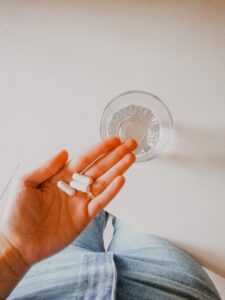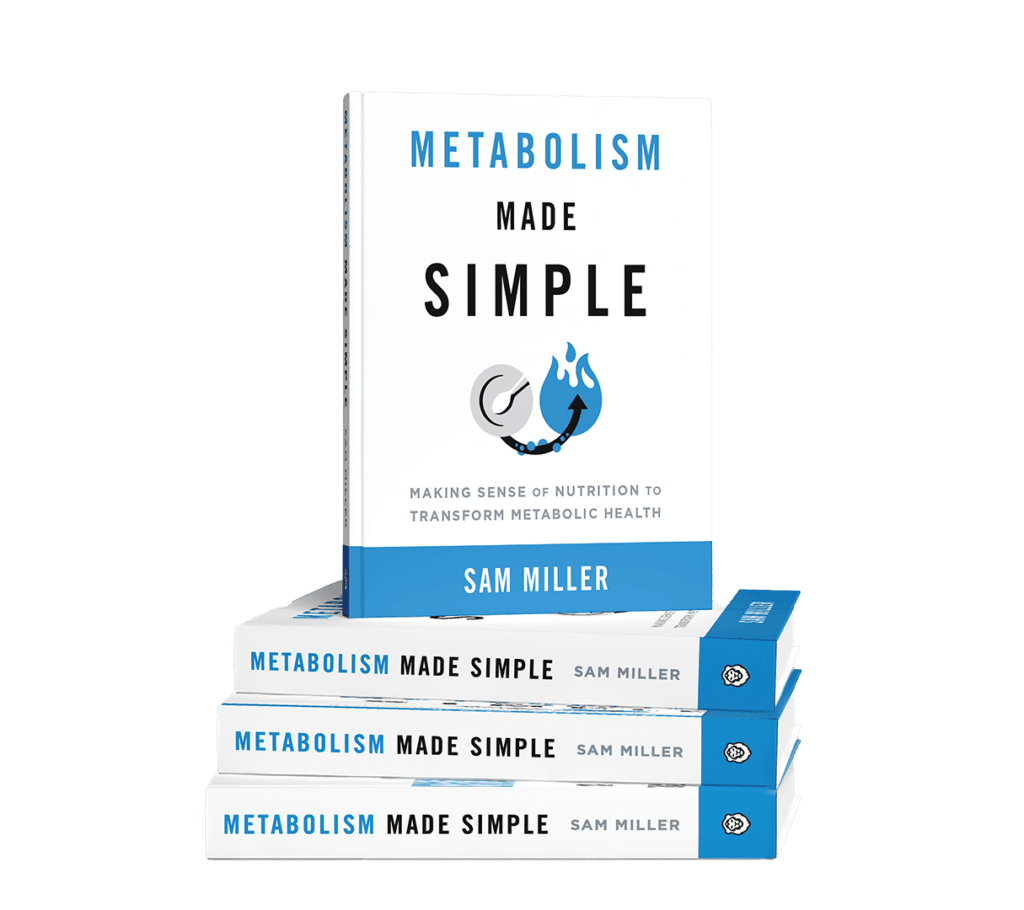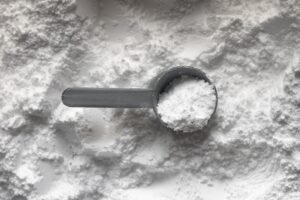Can Carbs Increase Your Testosterone?
Is it possible to raise testosterone levels with just macronutrients?
If you’ve read your share of nutrition articles, you know dietary fat and cholesterol get all the attention when it comes to hormone production.
Testosterone, like many of our other hormones, is derived from a hormone called pregnenolone. Pregnenolone relies on a cholesterol precursor to serve as the raw material for our hormonal production.
Consume a low-fat diet and you’re leaving testosterone on the proverbial table as you deny your body adequate resources and building blocks for this biochemical process.
But what about carbs? Is it possible that one of the most overlooked testosterone-raising strategies on the market is actually in your workout nutrition? The answer is a resounding yes.
Yes, you can boost testosterone levels naturally by eating carbs.
Though fat may provide the raw materials for production through cholesterol, carbs can protect your testosterone production by opposing cortisol via the production of insulin.
Table of Contents
Why You Might Want Higher Testosterone Levels
Testosterone is the male sex hormone that is present in both men and women, and there are several reasons why someone might want to increase their testosterone levels.
Testosterone is a key hormone in regulating muscle mass and strength, so increasing your testosterone levels can lead to improved muscle development and increased strength.
Additionally, testosterone plays a role in regulating body fat distribution, and low testosterone levels have been associated with increased body fat.
By increasing testosterone levels, you may be able to reduce body fat and improve your body composition.
There is also a link between low testosterone levels and decreased sexual desire and function, so boosting testosterone levels may help improve your sexual function and libido.
People with low energy and those who frequently feel like they are in a bad mood tend to feel better once they increase their testosterone levels.
How Does Insulin Affect Testosterone?
Testosterone is a hormone that plays a critical role in both men’s and women’s health. It is responsible for regulating muscle mass, bone density, libido, and mood, so you want to ensure you don’t have low testosterone levels.
Testosterone also plays a key role in metabolism and helps regulate blood sugar levels.
Go to the gym, crush a hard workout, and you’re likely to begin triggering a cortisol response along with an increase in muscle protein breakdown from your strength training.
While some cortisol is good, if it’s left unmanaged, you leave your body in a sympathetic state (categorized by heightened alertness and fight-or-flight), as well as a catabolic state.
A catabolic state refers to a metabolic state in which the body breaks down complex molecules, such as proteins and fats, to release energy. During a catabolic state, the body is typically in a state of stress or energy depletion and is using its own tissues as a source of energy (not ideal when trying to build muscle mass).
Your body’s sympathetic or catabolic state is further exacerbated by the fact that cortisol also inhibits STAR protein (Steroidogenic Acute Regulatory Protein) whose job is to regulate the transfer of cholesterol within your mitochondria.
STAR does exactly what it sounds like, it activates the synthesis of steroid hormones in the Leydig cells, which is the rate-limiting step in the production of your natural steroid hormones like testosterone.
In other words, less interference with that cholesterol transfer and less inhibition of testosterone production means you’re even closer to your goal-optimized performance.
You’re less likely to continue releasing cortisol to create energy if your body has enough carbohydrates and insulin during the time around your training session.
By limiting cortisol and preventing it from being chronically elevated, you can allow testosterone (an anabolic hormone) to fully function.
Increase Testosterone
Here are a few things to remember if you’re looking to boost testosterone naturally:
- Elevated cortisol causes you to enter a sympathetic or fight-or-flight state.
- Cortisol and testosterone are inversely related. They’re counter-regulatory hormones. This is partially because cortisol also robs the raw materials that would otherwise be used for increased testosterone production.
- Insulin is also inversely related to cortisol, and we know that strategically timed carb consumption is one of the best ways to trigger an insulin response to bring cortisol back down.
- Carbohydrates reduce cortisol production through insulin release and put your body back in a parasympathetic or “rest and digest” mode for recovery and muscle building.
- Managing cortisol by having a sufficient amount of carbohydrates allows you to preserve the resources (like cholesterol and pregnenolone) responsible for natural testosterone production.
How to Raise Testosterone Levels
As people age, testosterone levels naturally decline, and other factors such as poor diet, lack of exercise, and chronic stress can contribute to low testosterone levels.
Whether you’re looking to boost your testosterone levels for increased muscle mass, weight loss, or your overall health, there are ways to do it naturally and without relying on testosterone supplements.
Here are some tangible action steps that you can start doing now if you’re trying to increase testosterone levels.
1 – Use Cyclic Dextrin and Amino Acids
Cyclic dextrin and amino acids are two supplements that have been suggested to help increase testosterone levels.
The best way to control your cortisol response is by using carbohydrates like cyclic dextrin powder and peptides, EAAs (essential amino acids), and/or leucine to halt the overproduction of cortisol. Excessive cortisol robs the raw materials necessary for testosterone production.
Examples of supplements that can be helpful for testosterone hormone production include Biotest Plazma™, Surge® Workout Fuel, or blending cyclic dextrin with EAAs or structured amino acid peptides in your workout drink.
Solid food is NOT sufficient for this type of strategy, but when spaced appropriately can be added pre- or post-workout to enhance the effects of the recommended supplementation to boost testosterone levels.
2 – Individualize Your Dosing
EAAs and leucine can stimulate mTOR, insulin, and muscle protein synthesis during or after your workout. However, there’s a limit to the amount of carbohydrates that you need.
For the average-sized male lifter, start at 25-35 grams of a performance carbohydrate such as cyclic dextrin or isomaltulose and titrate your way up. Females start at 15 grams.
You can individualize your dosing based on body weight, the periodization of your programming, and as a percentage of your daily carbohydrate or macronutrient intake. When properly timed around your workout these carbs can enhance performance and optimize your hormone production.
More training volume means more need for carbohydrates, so be mindful of your total sets, reps, and load during your workout. I
t’s not uncommon for a 200-plus pound lifter doing a high volume, bodybuilding-style program to consume upwards of 50-75 grams of carbohydrates during this period.
3 – Add Some Leucine
For optimal results in your testosterone production, take 5–10 grams of leucine in addition to a balanced array of the other essential amino acids. Even if you have budgetary constraints you will want an absolute bare minimum of 3 grams daily.
Hydrolyzed peptides or essential amino acids are your best supplement investment around your workout, as studied by the International Society of Sports Nutrition.
Rapidly digested proteins that contain high proportions of EAAs and adequate leucine are the most effective in stimulating MPS according to the latest sports nutrition research (Jager et al. 2017).
4 – Start Conservatively with Carbs
Consuming too many carbs will cause a decrease in insulin sensitivity and will eventually be mediated by T3 and malic acid, so don’t ride this wave so high that you throw a wrench in other areas of your hormonal health (i.e. insulin sensitivity, fasted blood glucose, etc.).
Start with a dose of around 25 grams a day and increase your dosage depending on recovery and your total daily macronutrient intake. A caloric excess, even with optimized timing, can still potentially result in some problems.
Each 25-gram scoop of added carbohydrate alone is approximately 100 calories, so be mindful of where this fits in your daily nutrient and calorie totals. It does pack a punch for the number of calories you consume, but it’s still wise to note this in your overall nutrition strategy.
We’ve known for years now that workout nutrition plays an important role in exercise recovery and muscle growth — from triggering muscle protein synthesis to making you less sore after a training session, the compound effect of well-timed carbohydrates and amino acids is undeniable.
Carbs And Your Testosterone Levels
If you want to increase your T levels naturally, manipulating your carbohydrate intake is a great way to achieve this.
The next time you’re loading your supplement shopping cart, remember the effects of carbohydrates extend beyond simply fueling muscle recovery. Through properly timed nutrient consumption it’s possible to manipulate the endocrine system as well and have an additional transformation tactic at your disposal.
Overall, incorporating carbohydrates into a balanced and healthy diet can help support your athletic performance, help you achieve your optimal physique, and may have a positive impact on testosterone levels.
Sources
Jäger, R., Kerksick, C. M., Campbell, B. I., Cribb, P. J., Wells, S. D., Skwiat, T. M., … & Antonio, J. (2017). International society of sports nutrition position stand: protein and exercise. Journal of the International Society of Sports Nutrition, 14(1), 20. https://doi.org/10.1186/s12970-017-0177-8
[/et_pb_text][/et_pb_column][/et_pb_row][/et_pb_section]
















